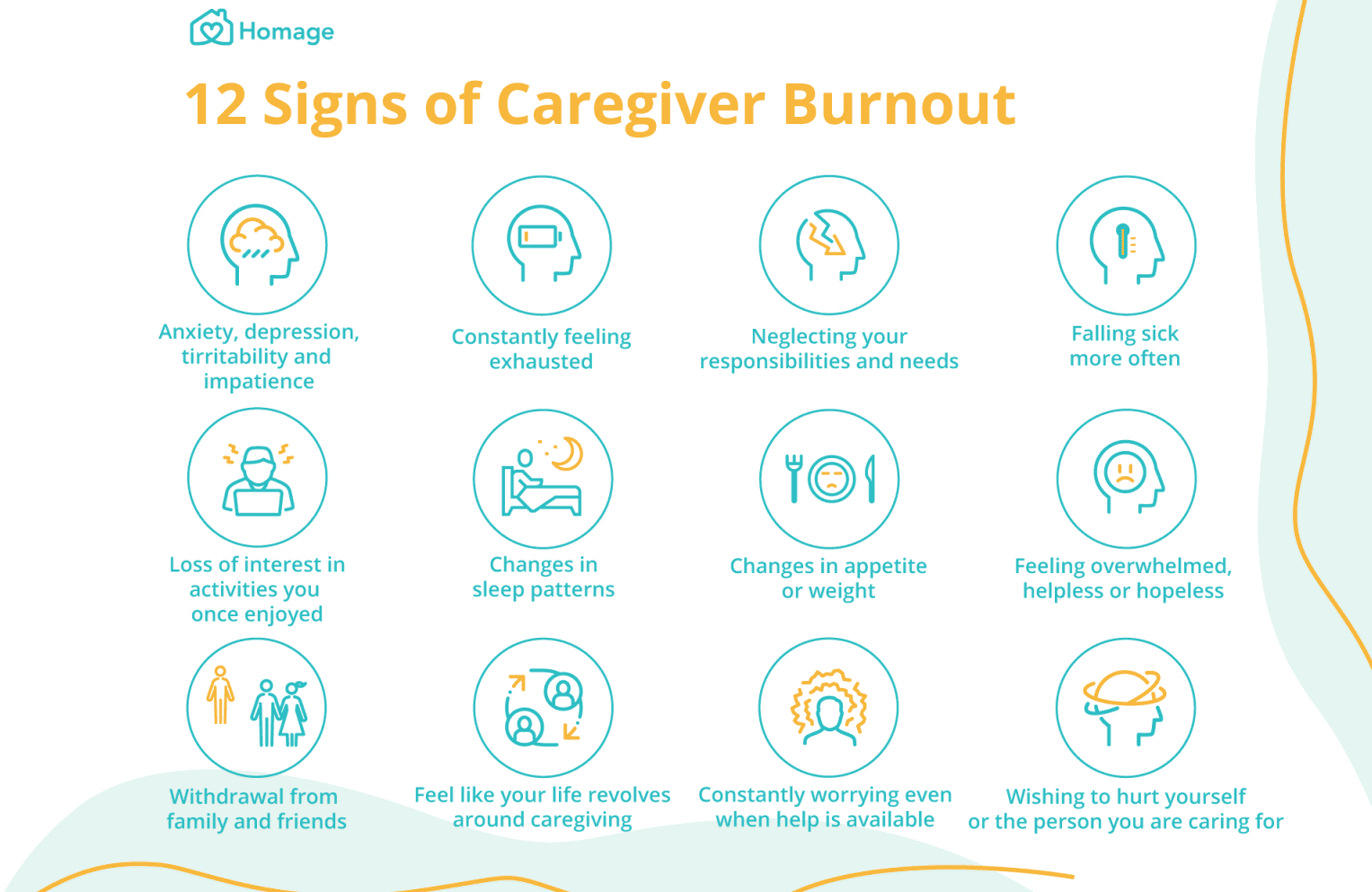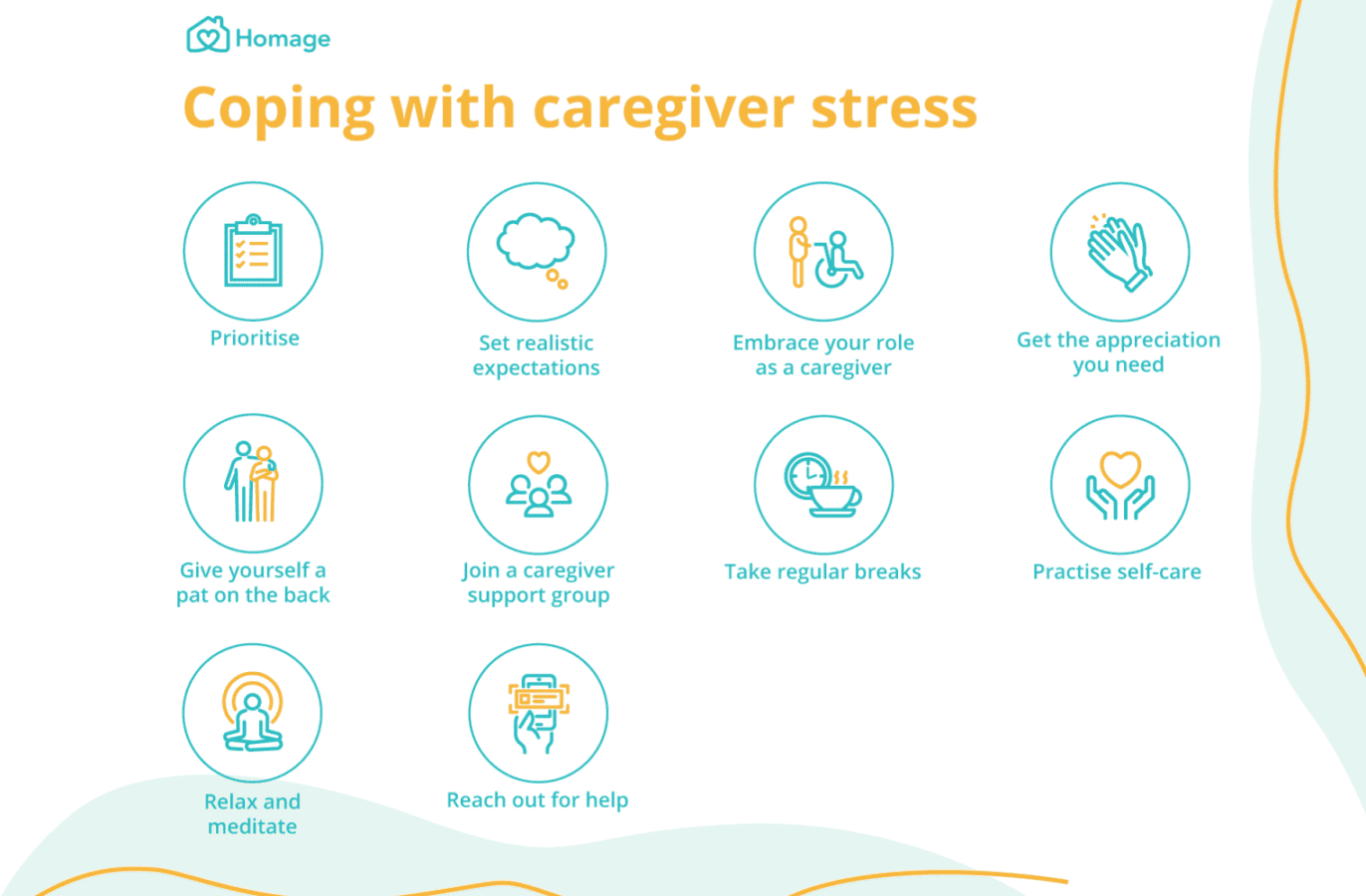

Tags: caregiver burnout, caregiving, self-care
This article is republished as part of a content partnership between Talk Your Heart Out (SG) and Homage (SG).
In simple terms, a caregiver is a person who tends to the needs or concerns of a person with short- or long-term limitations due to illness, injury or disability (John Hopkins Medicine).
While many of us are caregivers to our loved ones, we may not necessarily know how to manage or prevent a caregiver burnout. At times, when work and other daily activities get thrown into the mix of caregiving responsibilities we hold, it is natural that we feel increasingly overwhelmed.
Caregiving can be a long and demanding journey. In fact, 37% of caregivers have been providing care to a loved one for over a decade. The stress of caregiving can accumulate over time, and if left unchecked, the physical, emotional and mental exhaustion can lead to burnout.
If you are a caregiver to a loved one, read on to learn some tips to manage or prevent caregiver burnout, and consider exploring counselling for additional support.
Family caregivers often put the needs and interests of their loved one ahead of themselves, neglecting their own wellbeing in the process.
Having unrealistic expectations is one reason that may contribute to the stress that caregivers face. Sometimes, caregivers may expect their loved one’s condition or mood to improve from their involvement in the care process. However, this may not be possible for individuals with progressive conditions such as dementia or Parkinson’s.
Caregiver stress may also arise from external factors, such as a lack of support or pressure and expectations from family members. Sole caregivers may not have sufficient support for them to take breaks from caregiving. Other family members may also have unrealistic demands and expectations of the primary caregivers which add on to their stress.
Many caregivers also have to juggle multiple commitments and responsibilities on top of caregiving. Working caregivers may not be able to care for their loved ones especially during their shift, while the sandwich generation has to take care of both their children and parents at the same time.

Oftentimes, caregivers are so focused on the wellbeing of their loved ones that they don’t notice that it’s taking a toll on their own health. Here are some signs and symptoms that may indicate that you are experiencing caregiver stress or burnout:

Besides taking a toll on our health, caregiver burnout also affects the quality of care that our loved one receives. Here are some tips that can help us prevent burnout or recover from one, be motivated to deliver care, and make caregiving a fulfilling experience again:
Caregivers have a never-ending to-do list that’s impossible to complete. It’s easy to feel overwhelmed if you try to complete everything at one go. Instead, try to break down your tasks into smaller, actionable steps, prioritise them according to urgency and need, and establish a daily routine.
We often put a lot of pressure on ourselves as a caregiver to try to give our loved one the best care possible. However, it’s important to keep in mind that no one is a perfect caregiver. Remind yourself that you’re always doing the best you can and making the best decision possible at that point in time, and that is enough.
Sometimes, we expect to see visible changes in our loved one’s condition, feeling disheartened when it doesn’t improve. However, in some cases, there’s only a slim chance of improvement, especially if your loved one has a progressive condition such as Alzheimer’s. Managing your expectations can help to reduce the emotional toll of caregiving.
When faced with your loved one’s illness and/or the added responsibility of caregiving, you may feel that it’s unfair. While it’s important to recognise that your feelings are valid, it can be helpful to accept that some things are beyond your control. One may want to adjust one’s mindset instead.
Perhaps becoming a caregiver has allowed you to set a good example for your children or improved your relationship with your loved one. Accept your role as a caregiver and focus your energy on the positive and meaningful aspects of caregiving to keep you going.
Feeling appreciated can motivate us in difficult times. However, our loved ones may not always be able to feel or show their appreciation due to their condition. It might help to imagine how they would respond if they were well and remind yourself that they would show their appreciation if they could. Turning to family and friends for support and validation may help as well.
Don’t downplay the time and effort you put into caregiving. Give yourself a pat on the back and find ways to acknowledge and reward yourself. You could even come up with a list of how you’ve made a difference and refer to it every time you feel disheartened.
Being surrounded by people in a similar situation can be comforting. Besides providing validation and emotional support to one another, these individuals can share concrete and actionable strategies to cope with the challenges of caregiving. It’s also a great place to forge meaningful friendships. Here’s a list of caregiver support groups that you may consider joining. You may also wish to talk to a counsellor.
For caregivers, breaks are not a luxury, but a necessity. Pamper yourself – it could be treating yourself to a massage and spa or even something simple like taking a long relaxing bath. Make time to meet up with friends and do the things you enjoy. Don’t feel guilty for taking time off for yourself. Taking a break to recharge can help you become a better caregiver. After all, your life should not solely revolve around caregiving, you deserve to enjoy yourself too!
It’s important to take care of yourself before taking care of others. As a first step, make sure you have sufficient sleep. Sleep is important in improving our mood, energy, productivity, and ability to handle stress. Eating well can also boost our energy levels and keep us healthy.
While it can be a dread to exercise when you’re already stressed and tired, it can, however, be a great mood booster and help you stay healthy. Regular exercise can help us feel more energetic as well. Try to aim for 30 minutes a day, breaking it up into shorter sessions if it’s easier.
Going for regular health check-up is another aspect of self-care. While you are busy bringing your loved one to and fro medical appointments, make sure you make time for your own too.
Make time for relaxation or meditation into your daily routine to help relieve stress and boost your joy and wellbeing. Practise deep breathing, progressive muscle relaxation, yoga or mindfulness meditation. Even a few minutes a day can help you feel more composed when things get overwhelming.
Shouldering the entire scope of caregiving responsibilities by yourself is bound to lead to burnout. We all need a little help sometimes. Don’t be afraid to reach out for and accept help, be it from family and friends, volunteers or professional care providers like Talk Your Heart Out (TYHO).

Home care services can help relieve you of your caregiving responsibilities in the short-term so that you can take time off for yourself.
For caregivers who prefer for their loved ones to remain in the comfort and familiarity of home, engaging home care services can be a great option. Qualified nurses and caregivers can support your loved one with activities of daily living, nursing procedures and more.
When the going gets tough, it can help to remember that you’re not alone. Help is always available. Online counselling provides several benefits including professional support right from the comfort of your home. This is especially helpful for caregivers. Don’t hesitate to reach out for support when you need it.
This article first appeared on Homage.
Homage is an award-winning personal care solution that provides on-demand holistic home and community-based caregiving and medical services to seniors and adults, allowing them to age and recover with grace, control, and dignity.

If you are in crisis, or another person may be in danger, do not use this site. Please refer to these resources instead.

Mon - Fri (excluding public holidays)
9.30 AM - 6 PM (+08:00 GMT)
© 2026 Talk Your Heart Out Pte Ltd
Need Help? Chat with us
